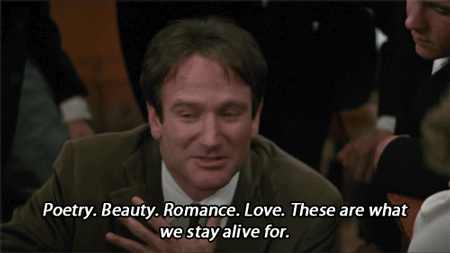by Julia Blakeney
You guys! It’s National Poetry Month! Unfortunately, it’s almost over. Fortunately, poetry is for all seasons. And I am here to talk to you about POETRY!

National Poetry Month was started in 1996 by the Academy of American Poets as a way to celebrate all that poetry has to offer. National Poetry Month seeks to show people the wonders of poetry, and its place in our culture and in the literary world.
In my belief, and I’m sure in many others, poetry is the oldest tradition in the literary world. Epic stories were often told in verse form; we are all at least a little familiar with Homer’s The Iliad and The Odyssey as well as epics like Beowulf and Chaucer’s The Canterbury Tales, which is mostly in verse. We all know the classic poetry, the most famous poets. We may all even be a little familiar with the different forms poetry has taken and the different eras it has gone through in the course of history. These are the things I find most beautiful about poetry: its ever-changing, ever-evolving, yet persistent and immortal nature. Poetry is everywhere, and will always be everywhere.
Now, I may not be in the same camp as some readers, but in the past, I have found myself desperately wanting to like certain canonical poets and poetry, but finding myself disenchanted with a lot of it. Don’t get me wrong, I have found a few favorites in the poetry of old: T.S. Eliot’s “The Love Song of J. Alfred Prufrock”, Samuel Taylor Coleridge’s “The Rime of the Ancient Mariner”, and John Keats’s “Ode on a Grecian Urn” being a few. I greatly admire Emily Dickinson, Robert Frost, and Edgar Allan Poe, as well. I also really liked, in a strange, sort of morbid way, John Donne’s “The Flea.” Sadly, however, I have to say that most of the time in my undergraduate poetry-as-literature class at LSU, I did not enjoy many of the poems our professor assigned to us, even some by poets that I really thought I would enjoy.
Don’t hold that against me, though, because during the next semester, I took a poetry writing class rather than a poetry-as-literature class, and that is when I discovered much more recent poetry that I naively (I’ll admit ignorantly) thought existed only online. Thanks to Mrs. Wilky, I discovered more female poets, which was something I had hoped to learn about in my poetry-as-literature class. In her class, I learned the most wonderful thing I had yet to learn about poetry: there is so much poetry out there that you can always find something you enjoy reading and can relate to.
 I am happy to say that since I started working at Lemuria, I’ve discovered wonderful contemporary poets who write poetry that I can relate to. In one of my first blogs for Lemuria, I took on Rupi Kaur’s Milk and Honey,feeling like no amount of words could do it justice. I have just recently finished Linda Pastan’s Insomnia: Poems, which was wonderful, and highly relatable for me; I feel the same way about it as I did Milk and Honey. It is a short little volume about living life and living it well in this incredibly fast-paced world, which I think many would love as much as I did. I have discovered books by other young poets, such as Tyler Knott Gregson; I found his “Typewriter Series” online years ago, but I never knew about his books, such as Wildly into the Dark.
I am happy to say that since I started working at Lemuria, I’ve discovered wonderful contemporary poets who write poetry that I can relate to. In one of my first blogs for Lemuria, I took on Rupi Kaur’s Milk and Honey,feeling like no amount of words could do it justice. I have just recently finished Linda Pastan’s Insomnia: Poems, which was wonderful, and highly relatable for me; I feel the same way about it as I did Milk and Honey. It is a short little volume about living life and living it well in this incredibly fast-paced world, which I think many would love as much as I did. I have discovered books by other young poets, such as Tyler Knott Gregson; I found his “Typewriter Series” online years ago, but I never knew about his books, such as Wildly into the Dark.
Anyway, I wrote about all my experiences with poetry to tell you that poetry is one of those things that I didn’t really enjoy until I related to it, and I am sure I am not alone in this. I have been grateful for the last few years to learn about the wonders of poetry, the versatility of poetry, through classes and amazing events like National Poetry Month, as well as just browsing the shelves at Lemuria.  The versatility of poetry is one of the things that drew me to it in the first place; poetry has many different uses: to convey love (or even hate) and other emotions, to appreciate nature, to appreciate culture, and to encourage activism. Whatever your interest, there’s going to be poetry out there for you to discover. Come and see sometime what poetry has to offer you.
The versatility of poetry is one of the things that drew me to it in the first place; poetry has many different uses: to convey love (or even hate) and other emotions, to appreciate nature, to appreciate culture, and to encourage activism. Whatever your interest, there’s going to be poetry out there for you to discover. Come and see sometime what poetry has to offer you.


Comments are closed.